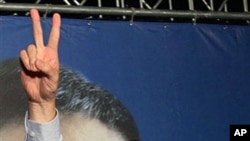Local election victories appear to have given Taiwan's pro-China Nationalist Party a head start in holding onto the presidency in 2012.
The Nationalist Party's victory in mayoral seats in three Taiwan cities gives it exposure that could be crucial to the presidential campaign in 2012.
Political analysts here say Saturday's election results indicate voters approve of the party's new economic links with China, despite political hostilities between Taipei and Beijing.
Many voters say economic stability was their priority in the election. The Nationalists have a record of fast economic development spanning several decades. Now the party wants to stabilize the economy after a deep recession by tapping into China's rapid growth.
While many voters say they like closer economic ties, fewer want the government to talk politics yet with Beijing. China claims sovereignty over Taiwan, which has been self-ruled since the Nationalists fled there at the end of China's civil war in 1949.
Taipei ad designer Jessie Kuan explains he is glad the Nationalists are not ready to discuss sovereignty with China's communist leadership.
He says Taiwan must build up its cities to catch up with international levels and pick mayors who can do it. He supports talks with China on cultural and economic exchanges that are good for Taiwan but hopes that his government avoids any political discussion with Beijing as it is too early for that topic.
Nationalist candidates won the mayors' races in Taipei and two other cities. The opposition Democratic Progressive Party, which advocates independence from China, held onto its traditional strongholds in the south.
After decades of tensions between the mainland and Taipei, President Ma Ying-jeou began efforts to build greater economic ties two years ago, including opening new transportation links to China and allowing more mainland tourists to visit.
Still, a legacy of hostility remains and China maintains its threat to go to war to stop any move in Taipei to declare independence. Beijing also has blocked Taiwan's efforts to take part in many international organizations. But the island's economy cannot compete without China's huge market and manufacturing base for Taiwan companies.
A Nationalist Party spokeswoman calls Saturday's results a vote for the party's economic platform, including ties with China.
Wang Kao-chen is a strategic studies professor at Tamkang University in Taipei.
"In comparison to the previous half year, Taiwan's economy is much better than before. I think that to some extent that helped the KMT's electoral performance because the five cities, the metropolitan cities, they would benefit earlier than other cities from economic improvement. So I think that benefited the KMT holding of the three of the five seats," said Wang. "And the improvement of cross-strait relations, too, I think that's closely linked to Taiwan's economic performance."
But politics in Taiwan have been historically volatile, and the issues that marked this election may well fade away by the 2012 presidential vote. However, Taiwan's relations with China still are likely to overshadow the political agenda over the next few years.
Raymond Wu is the managing director of the political risk consulting firm e-telligence.
"The de-escalation of tension in the Taiwan Straits in the past two and a half years has made Taiwan more integrated into the regional economy and into the regional community. This is something of course that gives the people of Taiwan a lot of confidence in terms of determining their own future,' said Wu . "And I do believe this will also put pressure on the political parties and the major candidates to look at what are the policies that are most appealing to the people Taiwan, economic prosperity of course, regional peace and improvement of relations with China."
However, there are plenty of voters in Taiwan who worry the Nationalists will bring the island too close to Beijing. That was evident in the vote tallies: final results show the opposition Democratic Progressive Party won more votes overall.
In an earlier version of this story we incorrectly reported that the Democratic Progressive Party won fewer votes than the Nationalist KMT party did. VOA regrets the error.




